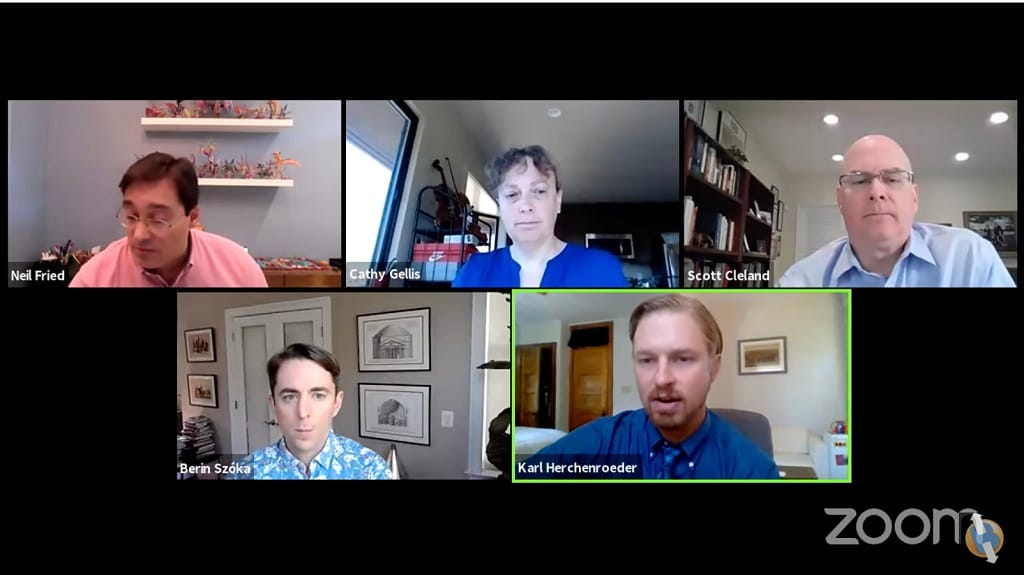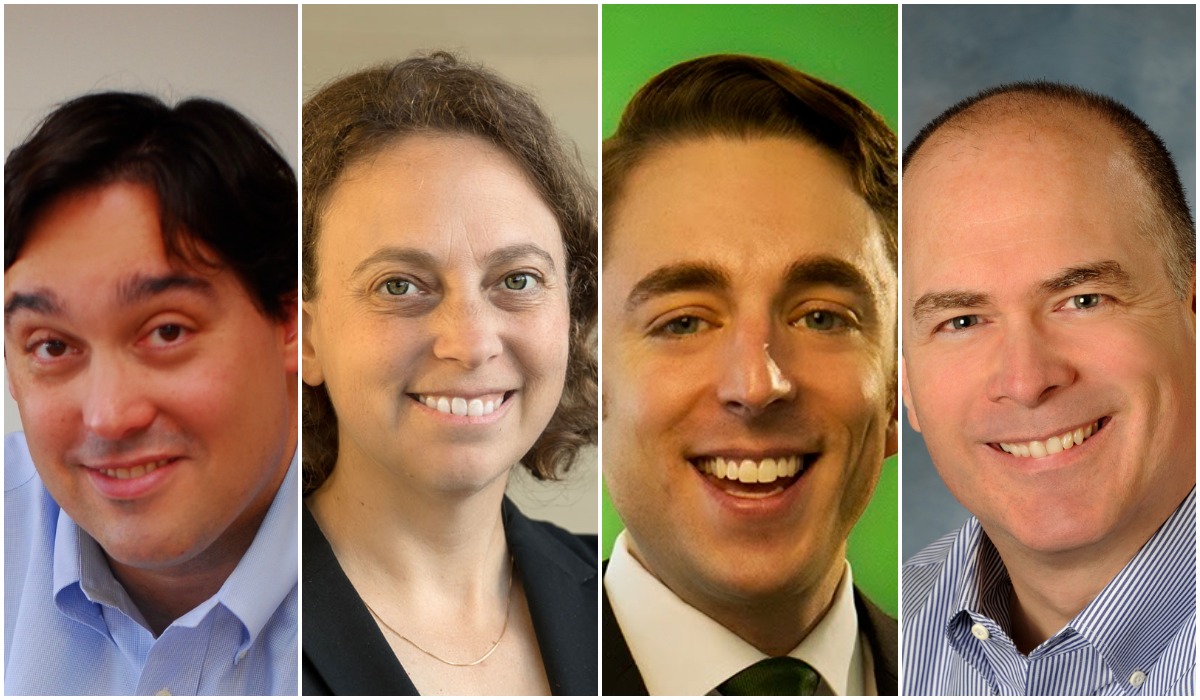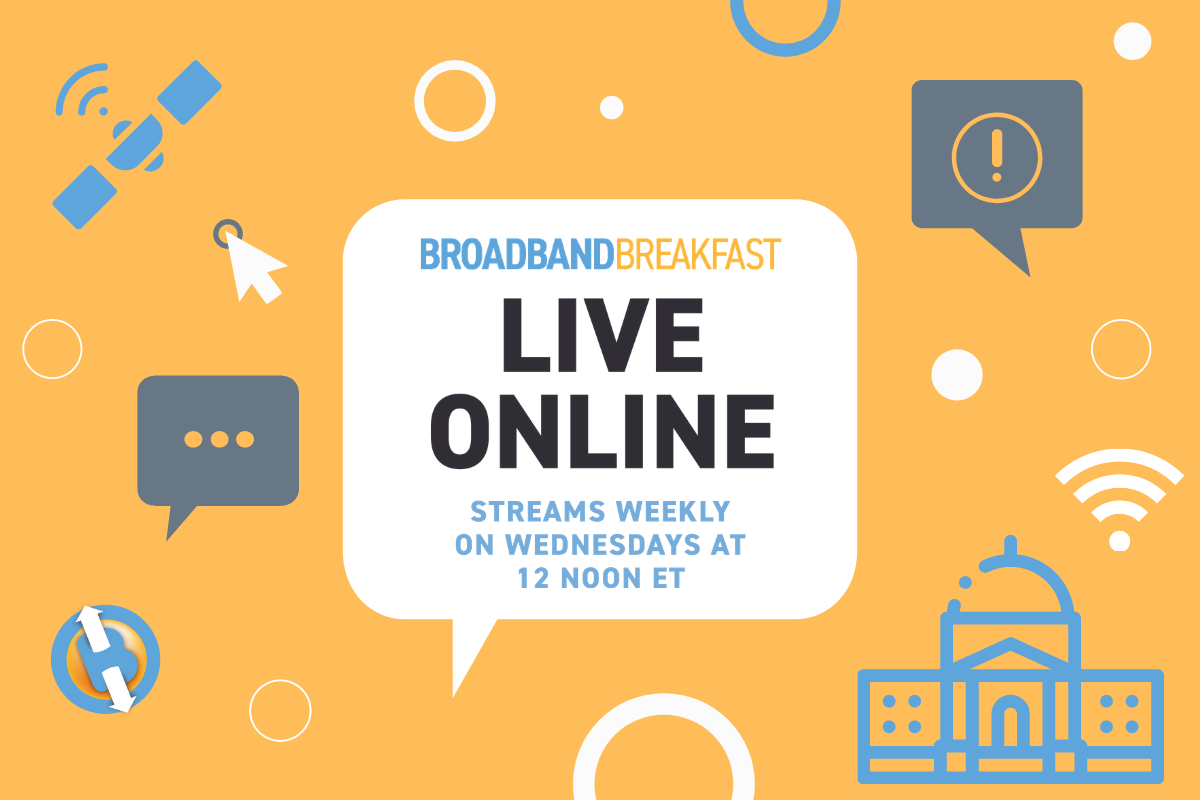Broadband Breakfast Hosts Section 230 Debate
Two sets of experts debated the merits of reforming or removing and maintaining Section 230.

June 1, 2021–Broadband Breakfast’s Live Online event hosted a debate about Section 230, with some arguing for a revision or a repeal and others suggesting it is integral to the healthy flow of information.
The debate, held on May 26 and moderated by Communications Daily’s Karl Herchenroeder, pitted DigitalFrontiers Advocacy founder Neil Fried and consulting company Precursor president Scott Cleland, who are proponents of Section 230 reform, against attorney Cathy Gellis and TechFreedom president Berin Szóka, who were for maintaining the safeguards protecting intermediary platforms from the liability posed by what their users post online.
Fried said Section 230 allowed platforms to moderate harmful remarks without the courts getting involved. His solution to blunt unlawful behavior is an adjustment to Section 230 creating more accountability. Reform could include distinguishing between small and large platforms, as they should not be treated the same.
Proponents of Section 230 have said that the likes of Facebook could never be without legal protections against what their users post.
Cleland shared the similar thoughts with Fried for the removal or adjustment of the provision. He explained that “repeal is comprehensive and constitutional”; he even went so far as to say “repeal is inevitable.”
For maintaining Section 230
On the other side, Gellis stated her position is that the provision “needs help, not destruction.” She explained Section 230 allows immunity to create a healthy ecosystem for the sharing of ideas. In her rebuttal, she noted the value the country puts on free speech should prevent rules from being put into place to moderate information.

“We need to keep our eye on the ball of the ecosystem, to make sure the ecosystem is equipped without artificial barriers… It is not about big tech…it is about every platform of every size.”
Szóka was quick on his feet to both reiterate Gellis’ beliefs and to counter Cleland’s claims. He said he agrees there is too much hate speech, but that does not mean the internet is lawless.
“There is very little the government can do about such speech because of the first amendment…we cannot directly ban hate speech,” Szóka said. “Section 230 aims to do the next best thing.”
Our Broadband Breakfast Live Online events take place every Wednesday at 12 Noon ET. You can watch the May 26, 2021, event on this page. You can also PARTICIPATE in the current Broadband Breakfast Live Online event. REGISTER HERE.

Wednesday, May 26, 2021, 12 Noon ET — “Unpacking the Controversies Around Section 230”
When Congress approved the Communications Decency Act as part of the Telecommunications Act in 1996, few saw Section 230 as the central issue surrounding online speech and debate. Long considered a foundational law for the internet in the United States, Section 230 has — slowly at first, but now in a torrent — come under reexamination. Join us for a debate between proponents and critics of Section 230.
Featuring panelists:
- Neil Fried, Founder, DigitalFrontiers Advocacy
- Cathy Gellis, Attorney
- Berin Szoka, President, TechFreedom
- Scott Cleland, President, Precursor
- Moderated by Karl Herchenroeder, Assistant Editor, Communications Daily
In an Oxford style debate, the audience will be polled at both the beginning and end of the event about the following resolution: “Section 230 is harmful and should be abolished or significantly changed.” Each panelist will give an opening statement and a rebuttal, following which the moderator and members of the live audience will be able to ask questions.
- First affirmative opening statement (6 minutes): Neil Fried
- First negative opening statement (6 minutes): Cathy Gellis
- Second affirmative opening statement (6 minutes): Scott Cleland
- Second negative opening statement (6 minutes): Berin Szoka
- First affirmative rebuttal (4 minutes): Scott Cleland
- First negative rebuttal (4 minutes): Berin Szoka
- Second affirmative rebuttal (4 minutes): Neil Fried
- Second negative rebuttal (4 minutes): Cathy Gellis
Explainer: With Florida Social Media Law, Section 230 Now Positioned In Legal Spotlight

Neil Fried was formerly chief communications and technology counsel to the House Energy and Commerce Committee and SVP for congressional and regulatory affairs at the Motion Picture Association. He also helped implement the 1996 Telecommunications Act while at the FCC and advised journalists while at the Reporters Committee for Freedom of the Press. In 2020 he launched DigitalFrontiers Advocacy, which advises clients on Communications Act and Copyright Act issues.
- The Myth of Internet Exceptionalism (DigitalFrontiers Advocacy)
- Why Section 230 Isn’t Really a Good Samaritan Provision (DigitalFrontiers Advocacy)
Frustrated that people were making the law without asking for her opinion, Cathy Gellis gave up a career as a web developer to become a lawyer so that she could help them not make it badly, especially when it came to technology. A former aspiring journalist and longtime fan of civil liberties, her legal work includes defending the rights of Internet users and advocating for policy that protects online speech and innovation. When not advising clients on the current state of the law with respect to such topics as platform liability, copyright, trademark, privacy, or cybersecurity she frequently writes about these subjects and more for outlets such as the Daily Beast, Law.com, and Techdirt.com, where she is a regular contributor.
- Section 230 Basics: There Is No Such Thing As A Publisher-Or-Platform Distinction (Techdirt)
- Is Section 230 Just For Start-ups? History Says Nope (Techdirt)
- Section 230 Isn’t A Subsidy; It’s A Rule Of Civil Procedure (Techdirt)
- If We’re Going To Talk About Discrimination In Online Ads, We Need To Talk About Roommates.com (Techdirt)
- Senators Warner, Hirono, And Klobuchar Demand The End Of The Internet Economy (Techdirt)
Berin Szoka serves as President of TechFreedom. Previously, he was a Senior Fellow and the Director of the Center for Internet Freedom at The Progress & Freedom Foundation. Before joining PFF, he was an Associate in the Communications Practice Group at Latham & Watkins LLP, where he advised clients on regulations affecting the Internet and telecommunications industries. Before joining Latham’s Communications Practice Group, Szoka practiced at Lawler Metzger Milkman & Keeney, LLC, a boutique telecommunications law firm in Washington, and clerked for the Hon. H. Dale Cook, Senior U.S. District Judge for the Northern District of Oklahoma.
- Justice Thomas’s Misguided Concurrence on Platform Regulation (Lawfare)
- No, Florida Can’t Regulate Online Speech (Lawfare)
- The Wall Street Journal Misreads Section 230 and the First Amendment (Lawfare)
Scott Cleland is a Christian, conservative, Republican and President of Precursor®, a responsible Internet consultancy. He is not a lawyer. He served as Deputy U.S. Coordinator for International Communications & Information Policy in the George H. W. Bush Administration, and Institutional Investor twice ranked him the #1 independent analyst in communications when he was an investment analyst. He has testified before eight congressional subcommittees a total of sixteen times.
- Cancel Section 230’s Cancel Powers (Daily Caller)
- Why Repeal Not Reform Section 230? (Daily Caller)
- The Achilles Heel Of Big Tech’s Cancel Power (Daily Caller)

Karl Herchenroeder is a technology policy journalist for publications including Communications Daily. Born in Rockville, Maryland, he joined the Warren Communications News staff in 2018. He began his journalism career in 2012 at the Aspen Times in Aspen, Colorado, where he covered city government. After that, he covered the nuclear industry for ExchangeMonitor in Washington.
Watch our 2:27 minute preview video on Section 230
WATCH HERE, or on YouTube, Twitter and Facebook.

As with all Broadband Breakfast Live Online events, the FREE webcasts will take place at 12 Noon ET on Wednesday.
SUBSCRIBE to the Broadband Breakfast YouTube channel. That way, you will be notified when events go live. Watch on YouTube, Twitter and Facebook.
See a complete list of upcoming and past Broadband Breakfast Live Online events.









Member discussion